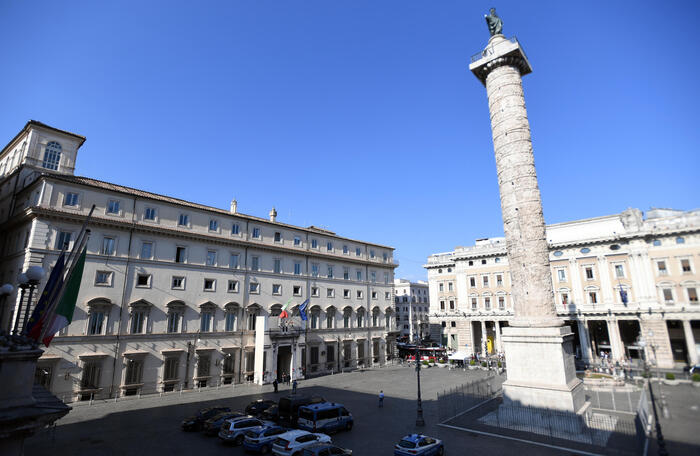Icon: enlarge
Photo: Florian Gaertner / photothek / imago images
When the last major pandemic hit the world, years of euphoria followed.
After the Spanish flu came the
Roaring Twenties.
The 1920s were a decade of new beginnings, socially, culturally, economically.
To the author
Photo:
Institute for Journalism, TU Dortmund
Henrik Müller
is professor for economic journalism at the Technical University of Dortmund.
Before that, the graduate economist worked as deputy editor-in-chief of manager magazin.
In addition, Müller is the author of numerous books on economic and monetary issues.
Every week he gives a pointed outlook on the most important economic events of the week for SPIEGEL.
After the devastation of World War I and the deadly epidemic that followed, the zeitgeist was on the rise in many countries.
It was a long boom that gradually spread to many economies.
In Germany, memories of this phase are overshadowed by the bloody initial phase of the Weimar Republic and the hyperinflation of 1923. But in Germany too, the
Roaring Twenties
began
at some point
.
At the end of a disastrous Corona year, the question arises: Can we now
expect the
Golden 2020s
?
Is the economy about to recover surprisingly quickly?
And how sustainable could it be?
The post-corona perspective
Virtually all forecasts currently predict that the economy will recover significantly in 2021.
In the third quarter of the past year, growth rates skyrocketed, only to be slowed down by renewed shutdowns.
The start of the vaccinations now gradually shows the perspective of the post-corona period.
The Kiel Institute for the World Economy (IfW), for example, predicts economic growth in Germany of 3.1 percent in 2021 and 4.5 percent in 2022.
According to the calculations, the pre-crisis level will be reached again towards the end of next year.
After that, things continue to pick up quickly - with falling unemployment, low inflation and gradually recovering public finances.
Other countries are facing a long dry spell.
Particularly in southern Euro states that have been badly damaged by corona, such as Italy and Spain, it will still be some time before they reach the economic performance of 2019 again.
But they too should be captured by a strong dynamic after the worst economic crisis in generations.
In any case, the stock exchanges have this scenario firmly in view, as the high valuations on the stock markets show.
Uncertainty and opportunity
There are three main factors that speak in favor of a rapid post-Corona upswing:
Less uncertainty:
The pandemic and the drastic restrictions that went with it have massively unsettled citizens and companies.
When the view of the future darkens, people react by locking themselves up: They spend less money.
Consumers save instead of consume;
Companies cut investment plans.
As a precaution, they build up cash reserves.
Who knows what's coming.
The gradual decline in uncertainty is now likely to have the opposite effect: Consumers will consume significantly more again.
Business investment began to recover as early as the second half of 2020.
It helps that political uncertainties have also been removed: The trade warrior Donald Trump is leaving the White House;
his successor Joe Biden at least gives hope for an easing of trade policy, especially with regard to Europe.
The hard version of Brexit is not coming after all;
After the last-minute Christmas deal on an agreement between Great Britain and the EU, the barriers remain at least a little high.
More freedom:
The recession of 2020 was also so severe because a large part of consumer spending was simply prohibited.
Not only gastronomy, entertainment, culture and sport were affected, but also tourism, which had a negative impact, especially in the southern European holiday countries.
If the restrictions are gradually lifted in the course of 2021, this will immediately stimulate consumer demand.
It is conceivable that many citizens will literally celebrate the end of the pandemic - and spend more than usual.
More state support:
The western states have tried to save their economies from collapse with programs of unprecedented sizes.
And they will only gradually reduce this aid.
In 2021, too, the loan-financed budgets will only be reduced slowly.
In the USA, the future President Biden is even setting out to achieve social and environmental goals with massive additional expenditure, provided that Congress plays along.
In the EU, too, the additional budgetary leeway that the Corona recovery fund has opened will only take effect with a time lag in the coming years.
In the long run, therefore, financial policy will also have a stimulating effect.
Probably the most important change in behavior of citizens in terms of economic policy was a radical change in savings behavior.
As a reaction to the imponderables of the corona crisis, the savings rates in the euro zone and the USA more than doubled in 2020, in Great Britain and in Canada even quintupled, according to the OECD: In Germany the increase is less strong, but here too, private individuals are now investing Cut 16.6 percent of their disposable income, five percentage points more than in 2019.
display
Title: Short-circuit politics: How permanent indignation destroys our democracy
Editor: Piper
Number of pages: 256
Author: Müller, Henrik
Buy for € 22.00
Price query time
December 27, 2020 6:51 p.m.
No guarantee
Icon: Info
Order at AmazonIcon: amazon
Order from ThaliaIcon: thalia
Product reviews are purely editorial and independent.
Via the so-called affiliate links above, we usually receive a commission from the dealer when making a purchase.
More information here
The big question is how sustainable these behavioral changes will be.
Much depends on this for further economic development.
If the citizens remain cautious, this could prolong the economic weak phase by years - and provoke even more generous government support measures.
If you give up your restraint after the end of the pandemic and possibly allow yourself additional pent-up consumption requests, economic overheating is even possible.
It is therefore crucial what happens next summer.
If the sun and vaccines ensure an early normalization, the corona shock could be forgotten relatively soon - and the desire to buy returns.
Citizens' consumer demand could then become an important driver of economic recovery.
The outcome of the German Bundestag election in September could also be relevant: If the result were unclear majorities and a long hangover, this would increase uncertainty again - not only in Germany, but possibly throughout Europe.
The basic experience of 2020
Productivity development will be of crucial importance for medium to long-term development.
There was one major growth driver in the 2010s: work.
The labor force participation of the local population increased as more and more workers immigrated from the rest of Europe.
The economy produced more because more work was put in.
This model is now reaching its limits.
The aging of society is causing the workforce to shrink;
At the same time, immigration is falling.
Whether the 2020s will be a golden or a gloomy decade therefore depends above all on whether it is possible to increase productivity.
That means: We have to make more of the available resources - economically, but also ecologically.
The conditions for this are better than feared.
The high level of savings made by private citizens means that there is an overwhelming supply of capital - just waiting for attractive investment opportunities.
There should be no bottleneck in financing new technologies.
more on the subject
An annual balance sheet: How the virus is changing the worldA column by Henrik Müller
Then there is the experience of the pandemic year.
In 2020, all eyes were on science, which was sometimes wrong - how could it be otherwise - but which ended up developing highly effective vaccines and drugs in record time.
The crisis has given new technologies a breakthrough - from the mRNA approach, on which the first vaccines are based, to video conferences, which have become standard communication programs within a few months.
Seen in this way, 2020 is impressive evidence of the potential that science and technology offer.
These experiences could have an impact on other problem areas - from climate change to the aging of societies - and both reduce environmental pollution and increase labor productivity.
This is a basic 2020 experience: technological advancement is possible and useful.
And it can be accelerated enormously through private entrepreneurship and capital.
The scientific and economic complex
In the past few weeks I have occasionally recalled a story that I was involved in creating almost exactly eight years ago.
We predicted the
Roaring Twenties back
then
.
By 2025, and possibly beyond, Germany can count on a substantial increase in prosperity.
By and large, it happened that way - until the corona pandemic broke out.
Can we build on this thread of the success story from 2021?
After all, Germany has an efficient scientific and economic complex that was able to record some spectacular successes in the past year.
The Nobel Prize for Chemistry went to Emmanuelle Charpentier, who in Berlin is the Max Planck Research Center for the Science of Pathogens
directs.
When it comes to developing corona vaccines, the German biotech companies Biontech and Curevac are among the world's leading companies.
There is a broad base of knowledge that Germany can help over some problems, including the technological change in the automobile industry that is so important for this country.
If it is possible to equip this scientific know-how with sufficient capital so that marketable products can be created, a lot will be possible.
The
Roaring Twenties
were also an era of exaggeration: high stock market prices and debt, as well as large external imbalances.
The euphoric era ended in 1929 with a gigantic crash that resulted in a global economic crisis, the consequences of which determined the 1930s.
Will we repeat the mistakes from then?
We can never be sure of it.
Because of the holidays, Müller's memo appears this week without an appointment preview.
Icon: The mirror









/cloudfront-eu-central-1.images.arcpublishing.com/prisa/3FI7KHR4GI7ABUOQDZ3ENWASZQ.jpg)





